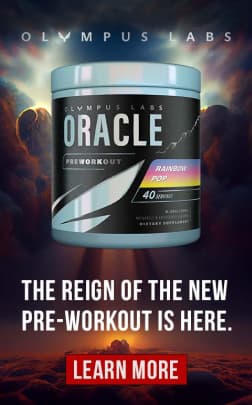Foods to Avoid When Building Muscle
Posted by Leonard Shemtob on Apr 25, 2023
Foods to Avoid When Building Muscle
When hitting the gym with the goal of building muscle and losing fat, it's important to know the foods to avoid when building muscle. Your diet plays a crucial role in your success, and there are some foods that can hinder your progress. This article will outline the worst foods for muscle growth and the foods to avoid when building muscle and losing fat.
Processed Foods
Fast Food
Fast food is one of the worst foods for building muscle. High in unhealthy fats and low in essential nutrients, it can lead to weight gain without any health benefits. Opt for lean protein sources, like chicken breast, fish, lean beef, or turkey instead.
Sugary Snacks and Drinks
Sugary snacks and drinks contain empty calories and can cause insulin spikes, making it harder for your body to build muscle. Stick to healthier options like water, amino acids, or green tea, and if you need a sweet treat, try a protein shake or make some homemade granola bars using healthy fats, like olive oil or coconut oil.
Refined Grains
Refined grains, such as white bread and pasta, have been stripped of nutrients and fiber. This can lead to overeating and hinder muscle growth. Choose whole grains for their health benefits and higher amino acid content.
High-Fat Dairy Products
Whole Milk, Full-Fat Cheese, and Ice Cream
These dairy products are high in saturated fat and calories. While dairy can provide protein and calcium, opt for lower-fat versions to support muscle growth without the extra calories.
Alcohol
In addition to putting stress on the liver, alcohol can impair muscle recovery and dehydrate your body, slowing down muscle gain. It also provides empty calories that don't contribute to muscle mass. Limit alcohol consumption to maximize your progress.
High-Sodium Foods
Canned Foods & Convenience Foods
High-sodium foods, such as canned soups and vegetables, convenience foods, deli meats, and frozen dinners can cause water retention and increase blood pressure, which can negatively affect muscle growth. Furthermore, many of these processed foods can be high in unhealthy fats, preservatives, and additives, which can be detrimental to overall health. To promote better muscle recovery and general well-being, it is advisable to stick to fresh, whole foods that are lower in sodium and free of harmful ingredients.
Foods High in Added Sugars
Candy, Cookies, and Sweetened Breakfast Cereals
Foods high in added sugars can lead to insulin resistance and inflammation, making it harder for your body to build muscle. Choose healthier snack options, like Greek yogurt with fruit or homemade granola bars.
Trans Fats
Deep Fried Foods, Baked Goods, and Margarine
Trans fats can cause inflammation and have a negative impact on heart health. Avoid deep fried foods and opt for cooking methods like grilling or baking with healthy fats like olive oil.
Ice Cream
Although ice cream might be a delicious treat, it's high in saturated fat and sugar, making it one of the worst foods for growing muscles. Choose a healthier dessert option, like a protein-packed smoothie or fruit salad instead.
Foods to Exclude From Your Diet
Some foods can greatly hinder your progress in building muscle and losing fat. Here are some foods you should avoid or limit in your diet:
- Fast Food: Fast food is typically high in unhealthy carbs and can cause digestive issues. Stick to healthier, whole food options for better muscle gains.
- Fried Foods: High in fat and cholesterol, fried foods can contribute to inflammation and heart disease. They can also upset your stomach and affect your workout performance.
- Alcohol: Alcohol can lower testosterone levels and interfere with muscle protein synthesis. It can also disrupt sleep, which is essential for muscle recovery and growth.
- Sugar: Refined sugars provide empty calories without any nutritional value. Consuming excessive sugar can lead to weight gain and hamper muscle growth.
- Diet Soda: Artificial sweeteners in diet sodas can negatively impact insulin production and reduce the effectiveness of the nutrients you consume for muscle growth.
- Refined Carbohydrates: Refined carbs, like white bread and cakes, are low in fiber and can contribute to fat gain. Choose whole grains and other complex carbohydrates for sustained energy and better overall health.
- Bagels: Bagels are high in simple carbs and can contribute to weight gain. Choose whole-grain bread with a source of protein and healthy fats for a more balanced meal.
- Dehydrated Fruits: Dehydrated fruits are often high in added sugar and can lead to excessive calorie consumption. Opt for fresh fruits instead.
- Pre-made Salads: Pre-made salads can be high in calories and unhealthy additives due to dressings and toppings. Prepare your salads at home with fresh, nutrient-dense ingredients.
- Premade Smoothies: Store-bought smoothies can be high in sugar and calories. Make your smoothies at home using whole fruits, leafy greens, and a healthy protein source like Greek yogurt or a protein powder.
- Processed Cheese: Processed cheese is lower in protein and contains artificial additives that can be harmful to your health. Opt for natural, high-quality cheese in moderation.
Foods to Include in Your Diet
To support muscle growth and fat loss, include nutrient-dense foods in your diet, such as:
- Lean Meats: Lean meats like sirloin steak, lean ground beef, and pork tenderloin are high in protein and essential for muscle growth.
- Vegetables: Vegetables provide essential vitamins and minerals, as well as antioxidants to support overall health and muscle growth.
- Grains: Brown rice, oatmeal, and quinoa provide complex carbohydrates for sustained energy during
- Fish: Fish like mackerel, salmon, herring, and tuna are rich in protein and omega-3 fatty acids, which support muscle protein production.
- Poultry: Eggs, chicken breast, and turkey breast are high in protein and essential amino acids like leucine, which is crucial for muscle growth.
- Fruits: Bananas, strawberries, and citrus fruits provide energy, vitamins, and antioxidants to support your workouts.
- Dairy: Dairy products like Greek yogurt and cottage cheese provide protein, calcium, and other nutrients to support muscle growth and bone health.
How to Calculate Your Protein Intake
The amount of protein individuals should consume varies depending on factors like age, sex, weight, and activity level. In general, the Recommended Dietary Allowance (RDA) for protein is 0.8 grams of protein per kilogram of body weight (0.36 grams per pound) for adults. This is the minimum amount required to meet the body's basic needs.
However, if you're looking to build muscle or are engaged in regular physical activity, you may need more protein. Many experts suggest that active individuals and athletes consume between 1.2 to 2.0 grams of protein per kilogram of body weight (0.54 to 0.91 grams per pound) daily.
It's important to note that these recommendations are general guidelines and individual protein needs can vary. It's best to consult a healthcare professional, registered dietitian, or sports nutritionist to determine the optimal protein intake for your specific goals and circumstances.
To Wrap Things Up...
Building muscle and losing fat requires a balanced diet rich in whole foods, lean proteins, and healthy fats. By avoiding the foods mentioned above, you can maximize your muscle growth and enjoy the many health benefits that come with a well-rounded diet. Remember to always prioritize muscle recovery and be mindful of the foods you consume to achieve your fitness goals.
Written and Sponsored by Leonard Shemtob
Leonard Shemtob is President of Strong Supplements and a published author. Leonard has been in the supplement space for over 20 years, specializing in fitness supplements and nutrition. Leonard appears on many podcasts, written over 100 articles about supplements and has studied nutrition, supplementation and bodybuilding.
Leonard's articles have been published in many top publications around the web. Leonard enjoys weight training, playing basketball and yoga, and also enjoys hiking. In his free time he studies and works on improving himself. For more detailed information, visit his official blog.
Continue Reading About Building Muscle
Muscle Building Food FAQs
Related Articles
Learn More About Building Muscle

- Institute of Medicine (2005). Dietary Reference Intakes for Energy, Carbohydrate, Fiber, Fat, Fatty Acids, Cholesterol, Protein, and Amino Acids. The National Academies Press.
- Phillips, S. M., & Van Loon, L. J. (2011). Dietary protein for athletes: from requirements to optimum adaptation. Journal of Sports Sciences, 29(Sup1), S29-S38.
- Monteiro, C. A., Moubarac, J. C., Cannon, G., Ng, S. W., & Popkin, B. (2013). Ultra-processed products are becoming dominant in the global food system. Obesity Reviews, 14(S2), 21-28.
- Fardet, A. (2016). Minimally processed foods are more satiating and less hyperglycemic than ultra-processed foods: a preliminary study with 98 ready-to-eat foods. Food & Function, 7(5), 2338-2346.
- Condrasky, M. D., & Hegler, M. (2010). How culinary nutrition can save the health of a nation. Journal of Extension, 48(2), Article 2COM1.
- Aragon, A. A., & Schoenfeld, B. J. (2013). Nutrient timing revisited: is there a post-exercise anabolic window? Journal of the International Society of Sports Nutrition, 10(1), 5.
- Helms, E. R., Aragon, A. A., & Fitschen, P. J. (2014). Evidence-based recommendations for natural bodybuilding contest preparation: nutrition and supplementation. Journal of the International Society of Sports Nutrition, 11(1), 20.
- Jäger, R., Kerksick, C. M., Campbell, B. I., Cribb, P. J., Wells, S. D., Skwiat, T. M., ... & Smith-Ryan, A. E. (2017). International Society of Sports Nutrition position stand: protein and exercise. Journal of the International Society of Sports Nutrition, 14(1), 20.
- Morton, R. W., Murphy, K. T., McKellar, S. R., Schoenfeld, B. J., Henselmans, M., Helms, E., ... & Phillips, S. M. (2018). A systematic review, meta-analysis and meta-regression of the effect of protein supplementation on resistance training-induced gains in muscle mass and strength in healthy adults. British Journal of Sports Medicine, 52(6), 376-384.
- Pasiakos, S. M., McLellan, T. M., & Lieberman, H. R. (2015). The effects of protein supplements on muscle mass, strength, and aerobic and anaerobic power in healthy adults: a systematic review. Sports Medicine, 45(1), 111-131.
- Ralston, G. W., Kilgore, L., Wyatt, F. B., & Baker, J. S. (2017). The effect of weekly set volume on strength gain: a meta-analysis. Sports Medicine, 47(12), 2585-2601.
- Schoenfeld, B. J., & Aragon, A. A. (2018). How much protein can the body use in a single meal for muscle-building? Implications for daily protein distribution. Journal of the International Society of Sports Nutrition, 15(1), 10.
- Schoenfeld, B. J., Ogborn, D., & Krieger, J. W. (2016). Effects of resistance training frequency on measures of muscle hypertrophy: a systematic review and meta-analysis. Sports Medicine, 46(11), 1689-1697.
- Slater, G., Dieter, B., Marsh, D., Helms, E., Shaw, G., & Iraki, J. (2019). Is an energy surplus required to maximize skeletal muscle hypertrophy associated with resistance training. Frontiers in Nutrition, 6, 131.
- Tipton, K. D., & Witard, O. C. (2007). Protein requirements and recommendations for athletes: relevance of ivory tower arguments for practical recommendations. Clinical Sports Medicine, 26(1), 17-36.
- Volek, J. S., & Kraemer, W. J. (2006). Creatine supplementation: its role in human performance. Clinics in Sports Medicine, 18(3), 651-666.
- Witard, O. C., Jackman, S. R., Breen, L., Smith, K., Selby, A., & Tipton, K. D. (2014). Myofibrillar muscle protein synthesis rates subsequent to a meal in response to increasing doses of whey protein at rest and after resistance exercise. American Journal of Clinical Nutrition, 99(1), 86-95.

